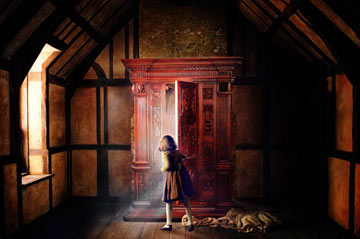
TODAY, my day off, Lynann and I saw "The Chronicles of Narnia: The Lion, the Witch and the Wardrobe." Or should I say, we saw it again.
THE SCENE in which little Lucy first discovers the wardrobe, with the light streaming in from the window on the left is one that has played in my mind for years. I have read the series four times, once in college, once shortly after seminary, and twice to my children when they were young. This is familiar territory for me. That means that four times--no, five now, I wept when Aslan laid his life down for the traitor and again at the apocalytic conclusion in "The Last Battle."
THE FILM faithfully represents the spirituality of C.S. Lewis. "Jack" Lewis (his real name was Clive Staples; no wonder his friends called him Jack) was a master of creating an alternate world to explore the realities of spirit. He did this in his Space Trilogy as well as his little masterpiece, The Great Divorce. He did not set out to write allegory, but a parallel world; some say that he was actually somewhat disappointed with the way The Lion, the Witch and the Wardrobe turned out: too close to allegory. His friend, J.R.R. Tolkien is said to have dislike it for that very reason. Tolkien also used Christian concepts in his writing (temptation, courage, facing death, blood sacrifice) but buried the elements far more deeply in the story. In the case of The Lion, the elements are all pretty much on the surface.
THAT REMAINS in the film version. Any child raised going to Sunday School can see it: The Lion (of Judah) lays down his life; sin requires an atoning death; He dies but is raised to life and triumphs over evil. Liam Neeson voices Aslan fully respecting the Christ-figure which Lewis created. He is (oddly enough) the most human and (most divine) figure in the film. To fail to see his night journey up to The Stone Table as both a Golgotha and a Via Dolorosa is to be either dull or Biblically ignorant--or both. Tilda Swinton nails Lewis' Jadis, the White Witch perfectly, that Satanic ability to charm, tempt, cajole and intimidate simultaneously.
IT IS GRATIFYING to see the fullness of C.S. Lewis' vision on the screen. The phrase that kept coming to mind is "fully realized." It is amazing, and a testament to the imagination and genius of Lewis that today, forty-two years after his death and nearly sixty years since Narnia first appeared. I cannot help to think that Jack would be pleased--and grateful.
No comments:
Post a Comment